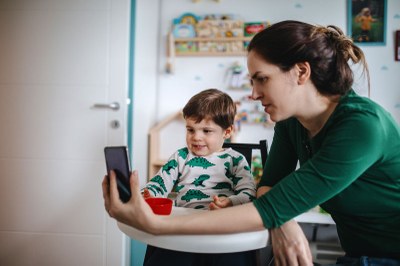Posted: April 10, 2020
Children’s development is shaped by multiple different factors including their family life, school, and the neighborhood they grow up in. While all of these factors play a direct role in promoting or impeding healthy development, it is important to recognize that the interaction between these factors has a tremendous impact on children’s overall well-being.

For example, positive interactions between children's parents or guardians and their educators can pay dividends in both children's home life and at school. More specifically, there is a body of research that has shown that when parents are involved and engaged in their children's education and have positive relationships with educators, children tend to do better academically and social-emotionally both in the short- and long-term. Given that many early care and education programs are currently closed in order to help slow the spread of COVID-19 it may seem like a particularly challenging time to connect with parents. However, this is also likely a time where parents and guardians and their children are in the greatest need of connection with early educators and stand to benefit from positive parent-educator relationships the most.
Parental involvement and positive parent-educator relationships
 In the broadest sense, parental involvement simply means that parents and guardians are invested in their children's learning and development. This is important for a bevy of reasons. Involved parents communicate to their children that education is important, they want their children to succeed, and their children are capable. These messages are then internalized by children and set the stage for how they view themselves and education moving forward. Positive parent-educator relationships and parent engagement go hand-in-hand. Educators can promote parent engagement through connecting with parents and building relationships. These positive relationships help build parental involvement and have benefits for the parent, educator, and child. Parents who have positive relationships with their children's educators have a better idea of classroom expectations and logistics and hold more favorable views of the school. Educators who feel connected with parents tend to view their roles more favorably and report less burnout. Finally, children with parents or guardians who hold positive relationships with their educators enjoy school more, perform better academically, and typically have fewer behavioral problems at home and at school.
In the broadest sense, parental involvement simply means that parents and guardians are invested in their children's learning and development. This is important for a bevy of reasons. Involved parents communicate to their children that education is important, they want their children to succeed, and their children are capable. These messages are then internalized by children and set the stage for how they view themselves and education moving forward. Positive parent-educator relationships and parent engagement go hand-in-hand. Educators can promote parent engagement through connecting with parents and building relationships. These positive relationships help build parental involvement and have benefits for the parent, educator, and child. Parents who have positive relationships with their children's educators have a better idea of classroom expectations and logistics and hold more favorable views of the school. Educators who feel connected with parents tend to view their roles more favorably and report less burnout. Finally, children with parents or guardians who hold positive relationships with their educators enjoy school more, perform better academically, and typically have fewer behavioral problems at home and at school.
Educators can promote parental involvement and connect with parents in a variety of ways including hosting open houses or back-to-school nights, providing volunteer opportunities, having an updated school website, and sending educational activities to try at home. While this may seem challenging from afar, now is a time when parents are likely to be seeking resources and activities to do with their young children. Additionally, parents often look to their children's educators as vital resources for understanding how to promote learning, healthy behaviors, and positive well-being among their children at home. Given the likely need for connection, as well as the benefits for children, parents, and educators alike, this a perfect time to connect with parents and encourage involvement in their children's education.
How can I build these relationships from afar?
 While the closure of many early care and education programs likely makes connecting with parents challenging at the time, this is also a period when both parents and educators are looking for connection. Also, children will be missing their educators, friends, and their school routines. To make this challenging time more manageable for all it is important to try and find mechanisms to connect with families. Although this may look different from how you typically engage with parents, it can still be done. Below are some ideas for how you can continue to support parent engagement and nurture positive parent-educator relationships.
While the closure of many early care and education programs likely makes connecting with parents challenging at the time, this is also a period when both parents and educators are looking for connection. Also, children will be missing their educators, friends, and their school routines. To make this challenging time more manageable for all it is important to try and find mechanisms to connect with families. Although this may look different from how you typically engage with parents, it can still be done. Below are some ideas for how you can continue to support parent engagement and nurture positive parent-educator relationships.
- Host parent-educator meetings through Zoom, Skype, or another video conferencing app. These meetings can be used to check-in with parents, allow them to ask questions, or even just visit.
- Host educator-child meetings. Children will love seeing their educators, even if it is virtually. Try to make these fun activities like a story time or a draw along.
- Record a lesson, craft, or story time activity and send out to parents. Parents likely will appreciate the opportunity to engage their children in a structured activity and again children will love being able to see their educators.
- Find opportunities for children and families to provide updates on how they're doing and what they've been up to. This can be done through multiple ways, including free apps designed to promote connections between families and schools (Seesaw is one example). This will allow children, their parents, and their educators to upload pictures or videos of different activities and provide feedback to one another.
- Send out electronic communication to let parents know that you are available if they have questions or concerns and provide updates about the program when possible. Just letting parents know that you are thinking of them and miss their children will go a long way.
- Send parents a list of activities to do at home with their children. If you are struggling to find activities, feel free to send them these Explore & Engage options compiled by Better Kid Care.
 Although this is an extremely challenging time for many reasons, finding ways to build and maintain connections between parents and educators will make this situation more manageable for all and will benefit the well-being of educators, parents, and their children. Hang in there!
Although this is an extremely challenging time for many reasons, finding ways to build and maintain connections between parents and educators will make this situation more manageable for all and will benefit the well-being of educators, parents, and their children. Hang in there!
For more information on engaging and connecting with parents please check out the following Better Kid Care online modules:
- "Engage Families and Build Relationships"
- "Family Child Care: A Unique Role in Supporting Family Engagement"
- "Get Parents and Families Involved in Your Program"
- "Infant Toddler Care: Partnerships with Families"
Article by Ben Bayly.

